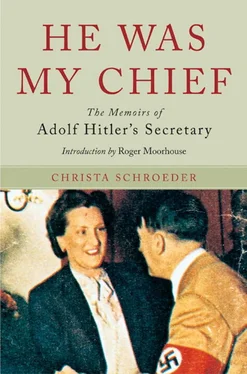Christa Schroeder - He Was My Chief - The Memoirs of Adolf Hitler's Secretary
Здесь есть возможность читать онлайн «Christa Schroeder - He Was My Chief - The Memoirs of Adolf Hitler's Secretary» весь текст электронной книги совершенно бесплатно (целиком полную версию без сокращений). В некоторых случаях можно слушать аудио, скачать через торрент в формате fb2 и присутствует краткое содержание. Город: Barnsley, Год выпуска: 2012, ISBN: 2012, Издательство: Frontline Books, Жанр: История, Биографии и Мемуары, на английском языке. Описание произведения, (предисловие) а так же отзывы посетителей доступны на портале библиотеки ЛибКат.
- Название:He Was My Chief: The Memoirs of Adolf Hitler's Secretary
- Автор:
- Издательство:Frontline Books
- Жанр:
- Год:2012
- Город:Barnsley
- ISBN:978-1-7830-3064-4
- Рейтинг книги:4 / 5. Голосов: 1
-
Избранное:Добавить в избранное
- Отзывы:
-
Ваша оценка:
- 80
- 1
- 2
- 3
- 4
- 5
He Was My Chief: The Memoirs of Adolf Hitler's Secretary: краткое содержание, описание и аннотация
Предлагаем к чтению аннотацию, описание, краткое содержание или предисловие (зависит от того, что написал сам автор книги «He Was My Chief: The Memoirs of Adolf Hitler's Secretary»). Если вы не нашли необходимую информацию о книге — напишите в комментариях, мы постараемся отыскать её.
He Was My Chief: The Memoirs of Adolf Hitler's Secretary — читать онлайн бесплатно полную книгу (весь текст) целиком
Ниже представлен текст книги, разбитый по страницам. Система сохранения места последней прочитанной страницы, позволяет с удобством читать онлайн бесплатно книгу «He Was My Chief: The Memoirs of Adolf Hitler's Secretary», без необходимости каждый раз заново искать на чём Вы остановились. Поставьте закладку, и сможете в любой момент перейти на страницу, на которой закончили чтение.
Интервал:
Закладка:
At that time I was a heavy smoker. Hitler said that because tobacco products were distributed to them freely, even young soldiers who had not been smokers previously had now taken up the habit. They should be given chocolate, not cigarettes. Everybody nodded in agreement, but I, already in a rather spirited frame of mind from my visit to the officers’ mess, chipped in and declared: ‘Ah, mein Führer , let the poor boys (I might even have used the word ‘swine’ here) have this pleasure, they don’t get any others!’ Ignoring my idiotic outburst, Hitler went on to explain how nicotine and alcohol ruined people’s health and addled the mind. Now I brought up the big gun and said, referring to photographer Heinrich Hoffmann: ‘One cannot really say that, mein Führer . Hoffmann smokes and drinks all day yet is the most agile man in the shop.’ At that Hitler understandably clammed up. Without another word he rose quickly and took his leave ‘ice-cold’ and with an aggrieved expression, from which I finally saw what I had done. Next afternoon when I enquired of the manservant in what mood the boss found himself today, Hans Junge gave Johanna Wolf and myself a long look and said that tea would be taken today without the ladies. Albert Bormann had been told to inform us officially. When I asked him, Bormann admitted in embarrassment that the boss was annoyed with me and would not be requiring the ladies’ company at tea.
Later that afternoon when Hitler called me for dictation I attempted to apologise but he cut me short, saying: ‘There is no need for you to apologise,’ maintaining an attitude of cold reserve. When Johanna Wolf tried to repair the damage, he replied bitterly: ‘that he had the feeling that it was a bore for us to be with him and he did not want us to be forced to sacrifice our evenings’. Henceforth I no longer existed for him. Since for example on train journeys he would ignore me even when we were sitting at the same table, I no longer went to the dining car but had the meal served to me in my compartment. This went on for some time until one day Albert Bormann appeared and said: ‘Little Miss Schroeder, the boss has asked me why you do not come forward.’ I misinterpreted this as a request and a gesture of reconciliation, and went to the dining car thinking that all was forgiven, but there he continued to ignore me. This made me ill, and I was away from FHQ for a few weeks to take the cure.
During my absence, Dara, who had meanwhile married, resumed her duties. A dietician-cook skilled in specialised diets, Frau von Exner had been given employment and the convivial tea sessions had been resumed. On the evening of my return I sat at Hitler’s right and left of Frau von Exner. After the usual kiss of the hand in greeting and an enquiry after my health he did not speak to me again. It was to be many months before Hitler forgave me for my faux pas .
In September 1943, as the Front began to pull back, he decided to fly to the most advanced line near Zaporozhye-Dnepropetrovsk and requested me to accompany him. During the night flight he dictated his orders to the troops to stand firm and spoke to me for the first time again on a personal note although the actual reconciliation did not follow until March 1944. I had severe sciatica and had gone to Bad Gastein to take the cure. On my birthday he sent me a bouquet of long-stemmed roses and a handwritten message of good wishes. This white card bearing his name and the sovereignty symbol engraved in gold was a very special honour which he used only for messages to ladies he held in high esteem such as Frau Goebbels, Frau Göring, Frau Troost, Winfred Wagner etc. I was very moved and mentioned in my letter of thanks that I had now made a vow never to smoke again. This letter apparently impressed him, for it became a conversation piece on several evenings around the fireplace at the Berghof where he was then staying temporarily. After the cure at Bad Gastein I was told to take a slimming course with Professor Zabel at Bischofswiesen near Berchtesgaden, which terminated with a special diet course at Bircher-Benner.
Here I would like to add something about Hitler’s two dietician-cooks, Frau Marlene von Exner and later Constanze Manziarly. During the Russian campaign Hitler’s stomach troubles had begun to cause him concern, and he had discussed the matter with the Romanian head of state Antonescu who had suffered for years from the same thing. Antonescu recalled an assistant in special diets at the University Clinic of Vienna, Frau Marlene von Exner, who had cured him by means of a strict but tasty regimen. On Hitler’s instructions Dr Morell sought a good dietician-cook at the Vienna Clinic and succeeded in hiring Frau von Exner. A small diet-kitchen was set up at FHQ and Frau von Exner set to work with a will. Hitler enthused over the varied menu, especially the Viennese desserts and the wonderful apple pies, which everybody agreed tasted wonderful (very thin pastry with thick layers of apple slices and if possible a small topping of whipped cream). The nightly tea session had been abandoned some time previously after an altercation when Hitler had gone into reclusion, but when I returned I found that it had been resumed, with Frau von Exner as an extra guest. She enlivened the conversation especially when she spoke about her home town of Vienna, this being very acceptable to Hitler.
On a visit to FHQ, Marshall Antonescu met Frau von Exner again. This delighted him and he made her the present of a tiny dog similar to a Yorkshire terrier, very temperamental and intelligent. Hitler considered this dog to be unworthy of a statesman because it was below Hitler’s approved size for dogs, and Reichsleiter Martin Bormann was given the job of finding a prize-winning fox terrier for Frau von Exner. Unfortunately the luck of the charming Viennese cook took a tragic turn when she fell in love with one of Martin Bormann’s adjutants. [81] This was SS-Obersturmbannführer Friedrich Darges (b. 8.2.1913 Dülseberg/Altmark). Hitler wanted Darges to marry Eva Braun’s sister Margarete, but Darges preferred Frau von Exner. It is assumed that Hitler was not happy with this arrangement and on 28 July 1944 Darges found himself on the Eastern Front with 5.SS-Panzer Division Wiking; 8.5.1945 interned by US Army; 30.4.1948 released.
Her racial origins were examined, and it was discovered that a grandmother of hers had been a foundling, which called into question her pure descent under the Aryan Law. Hitler would no longer touch the food she prepared, and his stomach symptoms reappeared. This all happened at a time when consideration was being given to reinforcing the bunker at Wolfsschanze against air attack and therefore FHQ was transferred temporarily to Obersalzberg. [82] Hitler left FHQ Wolfsschanze on 23 February 1944 and remained at the Berghof with short breaks until 14 July 1944, his last day there.
Frau von Exner was sent on leave using this as an excuse, and she was dismissed from service shortly afterwards. Reichsleiter Bormann was ordered to ‘arianise’ [83] Helene Maria ‘Marlene’ von Exner (b. 16.4.1917 Vienna). 15.7.1943 employed by Hitler; end 1943 Aryan genealogy examined and found defective (Jewish grandmother); 8.5.1944 dismissed from service; Bormann was ordered to ‘arianize’ the family. This was easier done in Austria than Germany and involved juggling old birth certificates to change the line of descent. Frau von Exner survived the war and was living in Austria when this book first appeared in Germany.
the von Exner family.
During Hitler’s stay on the Berg his food was prepared by the young Tyrolean Constanze Manziarly (not Manzialy as often misspelled) who was employed at Professor Zabel’s sanatorium in Bischofswiesen, to the Swiss Bircher-Benner recipe and then brought up to the Berg by car. Shortly before returning to the Rastenburg HQ at the beginning of July 1944, Fräulein Manziarly was invited to join the staff. I was taking the cure at the Zabel sanatorium at the time and she asked my advice. Unfortunately I recommended that she should accept and so this beautiful, tall, young brunette, a gifted pianist, served Hitler as his dietician-cook. He was quite taken with her, saying: ‘I have a cook with a Mozart name.’ At the end in 1945 Fräulein Manziarly had her diet-kitchen in the Führerbunker in Berlin and often dined with Hitler. After leaving the Reich Chancellery at the beginning of May 1945 she disappeared mysteriously. Nothing more was ever heard of her, although it is said that she took her own life using a cyanide capsule provided by Hitler. [84] Constanze Manziarly (b. 14.4.1920 Innsbruck). Greek father, Austrian mother; September 1944 employed by Hitler as dietician-cook; after April 1945 fate unknown.
Интервал:
Закладка:
Похожие книги на «He Was My Chief: The Memoirs of Adolf Hitler's Secretary»
Представляем Вашему вниманию похожие книги на «He Was My Chief: The Memoirs of Adolf Hitler's Secretary» списком для выбора. Мы отобрали схожую по названию и смыслу литературу в надежде предоставить читателям больше вариантов отыскать новые, интересные, ещё непрочитанные произведения.
Обсуждение, отзывы о книге «He Was My Chief: The Memoirs of Adolf Hitler's Secretary» и просто собственные мнения читателей. Оставьте ваши комментарии, напишите, что Вы думаете о произведении, его смысле или главных героях. Укажите что конкретно понравилось, а что нет, и почему Вы так считаете.












